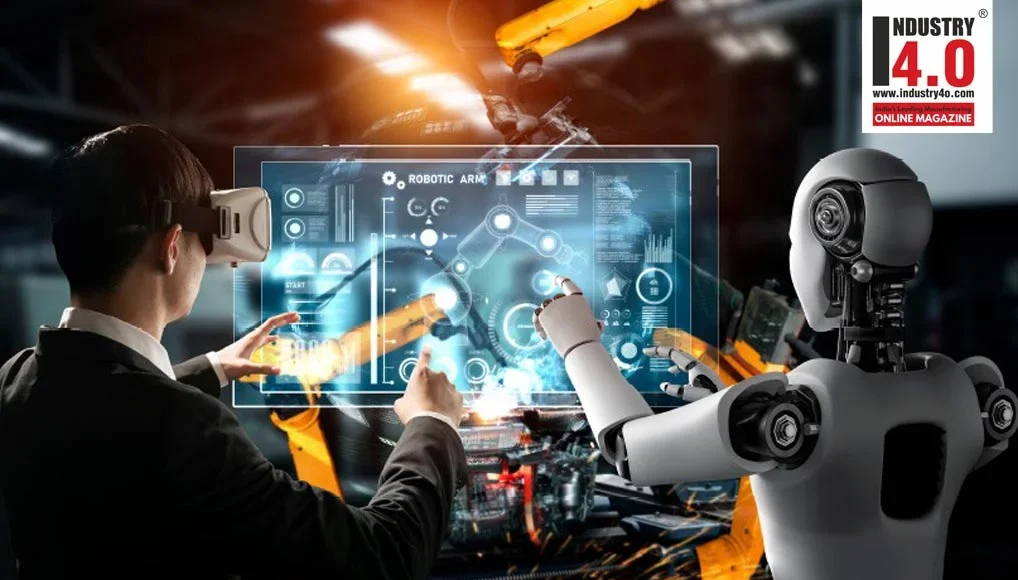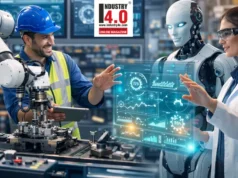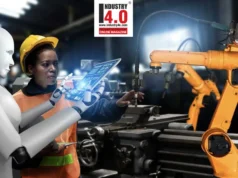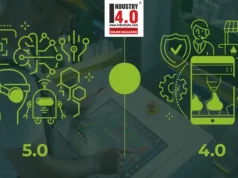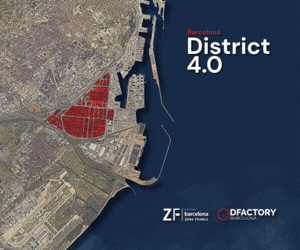Industry 5.0 : Empowering MSMEs and SMEs for a Sustainable and Resilient Future
Expanding the Horizon: Industry 5.0 and MSMEs
In a rapidly evolving industrial landscape, MSMEs and SMEs must continuously innovate to maintain their competitive edge. Industry 5.0 is not merely an upgrade; it is a paradigm shift that enhances human ingenuity with technological advancements. By integrating advanced robotics, artificial intelligence, and sustainable practices, MSMEs can achieve agility, customization, and efficiency while retaining a human-centric approach.
The Role of AI and Big Data in MSME Transformation
Artificial intelligence and big data analytics play a crucial role in Industry 5.0 by enabling predictive maintenance, demand forecasting, and process optimization. These technologies help MSMEs move beyond reactive strategies and adopt proactive measures that enhance productivity.
For instance, a leather goods MSME in Chennai implemented AI-powered demand forecasting to adjust production schedules dynamically. This not only reduced inventory holding costs but also improved cash flow management. By leveraging data-driven insights, MSMEs can streamline supply chains, minimize waste, and enhance customer satisfaction.
Skill Development and Workforce Transformation
One of the significant shifts in Industry 5.0 is the focus on human-robot collaboration rather than full automation. This necessitates upskilling employees to work alongside advanced machinery and AI-driven systems. Governments and private enterprises are investing in reskilling programs to equip the workforce with technical and analytical skills.
For example, an electronics MSME in Pune partnered with a local technical institute to train workers in AI-powered quality control systems. The outcome was a 30% reduction in defects and a significant boost in production efficiency. Such initiatives underscore the importance of continuous learning in the new industrial era.
Sustainable and Smart Manufacturing
Industry 5.0 prioritizes sustainability through energy-efficient manufacturing and circular economy principles. MSMEs can reduce carbon footprints by adopting green technologies such as IoT-enabled smart grids and AI-driven energy management systems.
A furniture MSME in Rajasthan switched to smart energy meters and AI-driven optimization for its manufacturing processes. The result was a 20% reduction in electricity consumption and lower operational costs. By integrating sustainability into business strategies, MSMEs not only contribute to environmental conservation but also attract eco-conscious customers.
Government Initiatives in India for Sustainable MSMEs
The Indian government has launched multiple initiatives to promote sustainability among MSMEs, encouraging them to adopt green technologies and reduce their carbon footprint. Some of the key initiatives include:
1. ZED (Zero Defect Zero Effect) Certification: This initiative by the Ministry of MSME encourages manufacturers to adopt green production techniques and improve efficiency while minimizing environmental impact.
2. Energy Efficiency Financing Scheme: Implemented by SIDBI (Small Industries Development Bank of India), this scheme provides financial assistance for MSMEs to adopt energy-efficient technologies.
3. National Solar Mission: Aimed at increasing the use of renewable energy, MSMEs are encouraged to install solar power systems through subsidies and incentives.
4. MSME Sustainable (ZED) Certification Scheme: This program promotes sustainability by providing financial assistance for technology adoption that enhances resource efficiency.
5. Waste to Wealth Mission: MSMEs are encouraged to leverage circular economy principles to convert industrial waste into usable resources.
How MSMEs Can Benefit from Government Initiatives
To take full advantage of these programs, MSMEs should:
1. Apply for Government Subsidies and Grants: By registering for schemes like ZED certification, businesses can access financial aid to adopt green practices.
2. Invest in Renewable Energy: Installing solar panels or switching to energy-efficient machinery can significantly reduce long-term operational costs.
3. Collaborate with Green Tech Startups: Partnering with sustainability-focused startups can provide access to affordable and innovative solutions.
4. Attend Government Workshops and Training Programs: These programs help MSMEs stay updated on new sustainability regulations and best practices.
5. Implement Circular Economy Practices: Recycling and reusing industrial waste can not only reduce costs but also attract sustainability-conscious customers and investors.
By integrating sustainable and smart manufacturing strategies, MSMEs can future-proof their operations, improve profitability, and contribute to India’s green economy.
Blockchain for Transparency and Trust
Blockchain technology is another transformative tool for MSMEs under Industry 5.0. It enhances transparency in supply chains, secures transactions, and prevents fraud. By using blockchain, MSMEs can build trust with suppliers and customers while ensuring compliance with global standards.
A spice export MSME in Kerala adopted blockchain to trace product origins, ensuring authenticity and quality. This move significantly improved its brand reputation and opened new international market opportunities. Blockchain fosters trust and efficiency, making MSMEs more resilient in a competitive global market.
Future Prospects: The Road Ahead
While the adoption of Industry 5.0 presents immense opportunities, challenges such as high initial investments, technology integration complexities, and cybersecurity threats must be addressed. Governments and industry bodies must provide support through funding programs, policy frameworks, and digital literacy initiatives.
For MSMEs, the roadmap to Industry 5.0 should include:
1. Gradual Digital Adoption: Implementing technology in phases to ensure smooth integration.
2. Strategic Partnerships: Collaborating with tech startups and academic institutions for research and development.
3. Investment in Cybersecurity: Ensuring data protection and system resilience against cyber threats.
4. Sustainable Business Models: Prioritizing eco-friendly innovations and ethical production practices.
Conclusion
Industry 5.0 is the bridge between technology and humanity, emphasizing collaboration, sustainability, and innovation. For MSMEs, this new era offers a pathway to resilience, enhanced customer engagement, and sustainable growth. By embracing AI, robotics, and green technologies, MSMEs can redefine success and thrive in an increasingly digital and competitive world. The future belongs to those who adapt and innovate—Industry 5.0 is the catalyst for this transformation.
About the Author :

Dr. Subhashini Suresh is a distinguished academic and research professional with a Ph.D. in Management and over 25 years of experience spanning academia and industry.
Dr. Subhashini Suresh has held leadership roles in premier institutions, contributed extensively to research with multiple patents, journal publications, books, and serves as a research guide and consultant.
Dr. Subhashini Suresh is also a seasoned educator, currently associated with Edgewood College (USA). Her work integrates AI, finance, education, and innovation.
Dr. Subhashini Suresh is recognized with numerous awards including the Academic Excellence Award 2023 and National Faculty Award 2021.
Dr. Subhashini Suresh is Bestowed with the following Licenses & Certifications :
https://www.linkedin.com/in/dr
Dr. Subhashini Suresh is Accorded with the following Honors & Awards :
https://www.linkedin.com/in/dr
Dr. Subhashini Suresh is awarded with the following Patents :
https://www.linkedin.com/in/dr
Dr. Subhashini Suresh can be Contacted at :

